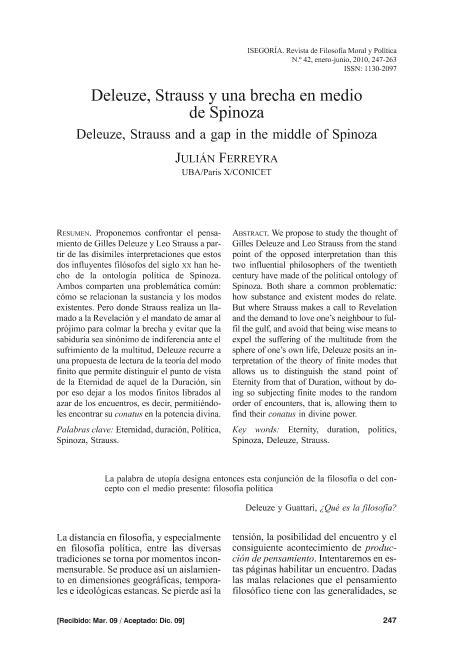Artículo
Proponemos confrontar el pensamiento de Gilles Deleuze y Leo Strauss a partir de las disímiles interpretaciones que estos dos influyentes filósofos del siglo XX han hecho de la ontología política de Spinoza. Ambos comparten una problemática común: cómo se relacionan la sustancia y los modos existentes. Pero donde Strauss realiza un llamado a la Revelación y el mandato de amar al prójimo para colmar la brecha y evitar que la sabiduría sea sinónimo de indiferencia ante el sufrimiento de la multitud, Deleuze recurre a una propuesta de lectura de la teoría del modo finito que permite distinguir el punto de vista de la Eternidad de aquel de la Duración, sin por eso dejar a los modos finitos librados al azar de los encuentros, es decir, permitiéndoles encontrar su conatus en la potencia divina. We propose to study the thought of Gilles Deleuze and Leo Strauss from the stand point of the opposed interpretation than this two influential philosophers of the twentieth century have made of the political ontology of Spinoza. Both share a common problematic: how substance and existent modes do relate. But where Strauss makes a call to Revelation and the demand to love one’s neighbour to fulfil the gulf, and avoid that being wise means to expel the suffering of the multitude from the sphere of one’s own life, Deleuze posits an interpretation of the theory of finite modes that allows us to distinguish the stand point of Eternity from that of Duration, without by doing so subjecting finite modes to the random order of encounters, that is, allowing them to find their conatus in divine power.
Deleuze, Strauss y una brecha en medio de Spinoza
Título:
Deleuze, Strauss and a gap in the middle of Spinoza
Fecha de publicación:
06/2010
Editorial:
Consejo Superior de Investigaciones Científicas
Revista:
Isegoría
ISSN:
1130-2097
Idioma:
Español
Tipo de recurso:
Artículo publicado
Clasificación temática:
Resumen
Palabras clave:
Eternidad
,
Duración
,
Política
,
Strauss
Archivos asociados
Licencia
Identificadores
Colecciones
Articulos(SEDE CENTRAL)
Articulos de SEDE CENTRAL
Articulos de SEDE CENTRAL
Citación
Ferreyra, Diego Julián; Deleuze, Strauss y una brecha en medio de Spinoza; Consejo Superior de Investigaciones Científicas; Isegoría; 42; 6-2010; 247-263
Compartir




